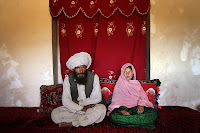
This photo by Stephanie Sinclair, a UNICEF Photo of the Year 2007, depicts an 11-year-old Afghani girl and her 40-year-old groom. Writing in Spiegel Online, Dutch writer Leon de Winter bluntly critiques the West's reaction to images like this one.
There are people who will look at this image and be able to continue with business as usual -- without disgust, nausea and rage. We are beholding the fiercest barbarism imaginable. But a carefree cultural relativism -- which this age has donned as its outward manifestation of decadent indifference -- allows many to simply look away. They turn away from the sight of an 11-year-old girl, who is about to be raped by the man sitting next to her.De Winter points out that, at some level, this girl probably knows what is happening to her is wrong, but she also sees it as her fate. The man, on the other hand, is just sticking to tradition, which works decidedly to his advantage. He argues that we in the West have a responsibility, despite the trappings of political correctness, to do something about the situation.
The girl was sold by her parents, even if they probably wouldn't use that word. The caption that came with the photo quoted the parents as saying that they "needed the money."
Our eyes behold an abomination. Our eyes have learned to see the world from the perspective of a slowly acquired sense for humanity. And although more and more voices tell us that we -- the former colonialists and imperialists -- have lost the right to judge other cultures, we know just as well as this girl that this marriage is wrong. ...Elsewhere, I find that De Winter supported the invasion of Iraq. I can't agree that we should invaded Iraq, and I still don't believe we did it in the name of human rights. That's a revisionist history the Bush administration sold us after they failed to discover weapons of mass destruction in Iraq. But I do agree that if we're in Afghanistan, and ostensibly rebuilding that country, we should be doing all we can to maintain the rights of the people living there.
Many of us in the West are convinced that our presence in Afghanistan cannot be justified, that our troops should withdraw and that Afghanistan should be left to the Afghans. They ask themselves: Who are we to believe that it is inhumane to sell an 11-year-old girl? Who are we to impose our values so vehemently on the Afghans, on this man and on this girl?
I don't have a clue who we are. But I know that this universe is not only a universe of iPods, Disneylands, CO2 penalties, tax write-offs, and New Year's sales in our department stores. No, I know that this is also a universe of human rights. I know that this universe is deeply shaken -- right down to its core -- by the suffering of this lonely, lonely little girl.
For the same reason, I find myself in the unenviable and unpopular position of being against the war in Iraq, but also against leaving any time soon. We should never have gone there in the first place, but we created the mess that's over there; we should be ashamed to leave it for the Iraqis to clean up. In other words, there's is a price to pay for the Bush administrations ineptitude. I don't think we can in good conscience create such a problem, then simply walk away, complaining about how the Iraqi leadership should've gotten their act together. We, as a country, voted for Bush - twice - and we should take the consequences that came with his administration's barbaric response to 9/11. Iraq isn't an iPod that fickle Americans can return because they decided they couldn't afford it after all. We have our starter marriages, we flip houses, we get liposuction instead of dieting and exercising. We want the quick fix. It's in our DNA. Well, that attitude will mean tragedy for Iraq.
I understand how some could perceive thoughts like this as a sort of 21st Century White Man's Burden. But I'm not suggesting we change people's cultures, that we make them all speak English and read the Bible. And I'm certainly not suggesting that we invade every country that has what we perceive to be human rights violations. Butt what do we do? Where do we draw the line? Do we ignore every transgression, equipped with the cloudy strain of moral relativism that de Winter angrily describes? Or do we decide as humans beings (not Americans, not Caucasians, not Christians) what the essential human rights are? I think so. And then we strenuously defend them.
One simple way to do that would be to support UNICEF.
No comments:
Post a Comment